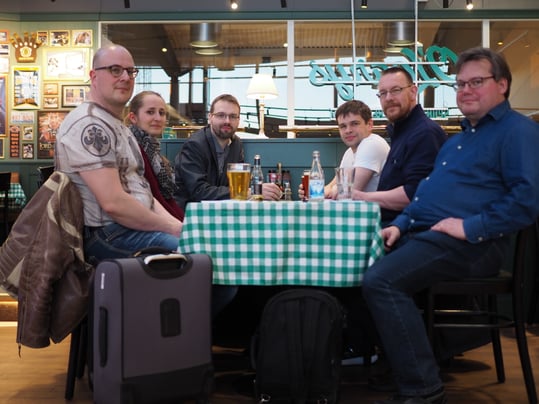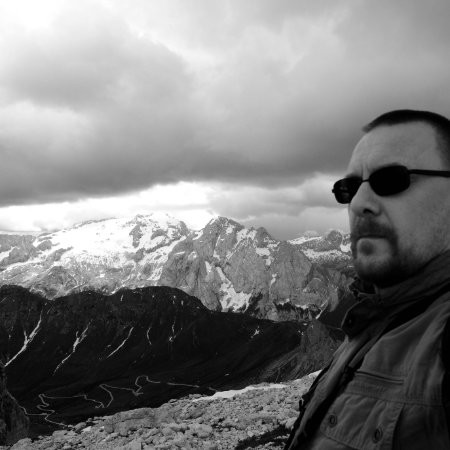Knowit Developer Summit 2019 - a travel report
This year's KDS was held at the heart of Stockholm, at the Radisson Blu Waterfront Hotel. Two days of mostly short talks about various software related topics, with a bit of hardware thrown in for good measure.
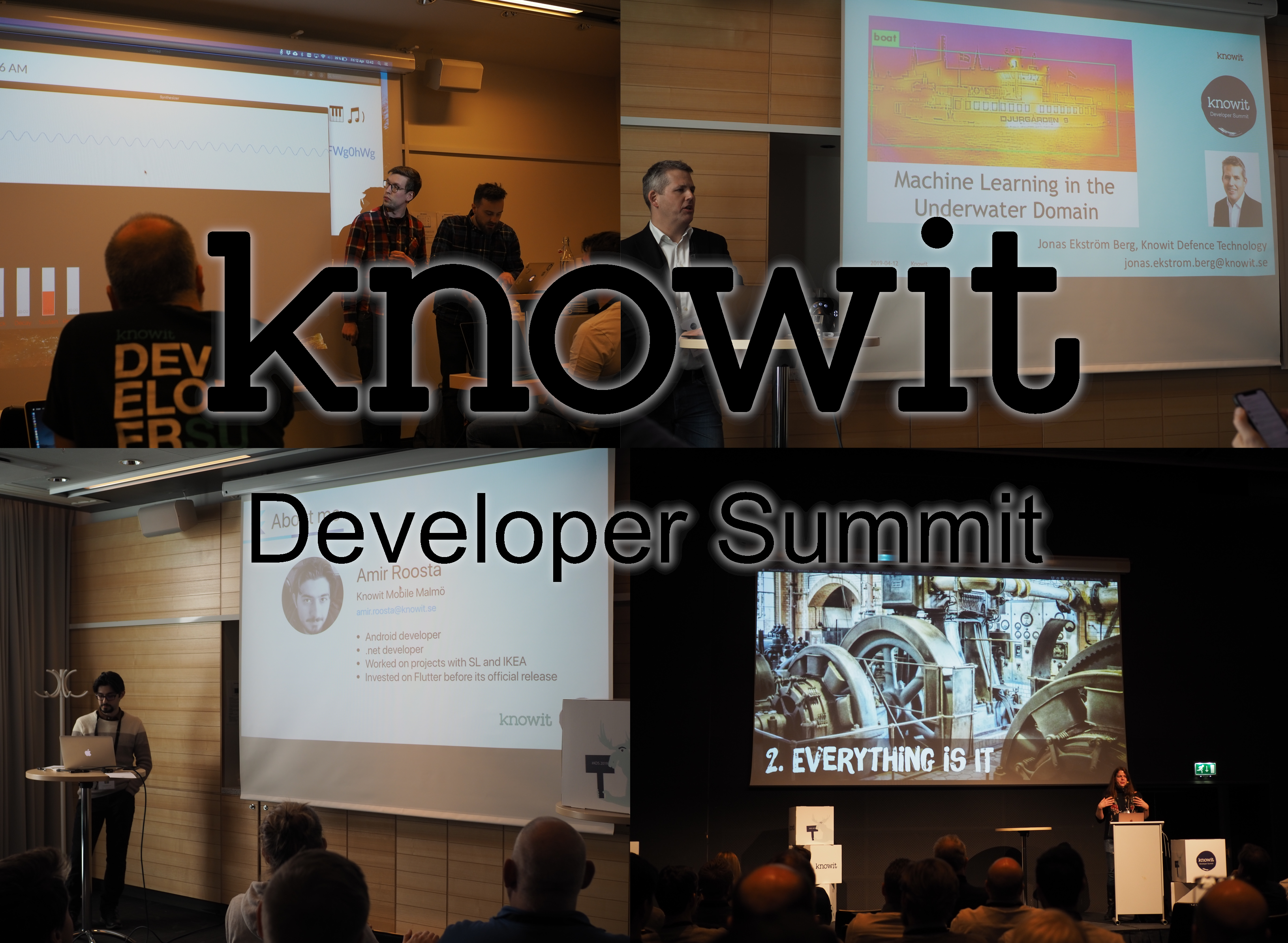
Being my first time in this conference, I did not have much expectations, good or bad. However, I did go through the schedule and preselect the talks I felt were most interesting, and followed this plan through. There were three or four simultaneous tracks ongoing for the two days, so I would assume there was at least something of interest for each and every one of the 100+ participants.
Most of the talks were only 30 minutes long - some 1 hour shows too, and then the 10 min lightning talks - so the presenters usually had time to only superficially skim through the subject matter. This is the downside of a rich set of topics available, but probably a norm for any kind of conference. I try to see these talks as an invitation for a further study later on.
So, what was the pick of the litter for me? Here's some mementos of the 2 days. Please note that I may well have misunderstood, or forgotten, many of the details I'm about to blab about.
I started on a Rust workshop, presented by a trio from Knowit Objectnet AS, that aimed at creating one's own synthesizer. Unfortunately my Windows, or my VirtualBox, or both, decided to play a practical joke, so my Ubuntu with a prepared Rust toolchain got inaccessible. 2,5 GB of downloads for a Windoze toolchain and a good part of the first part of the workshop wasted, but I did manage to get out an audible sine wave of 1 kHz - full volume of course. No names revealed, but I wasn't the only one played for a fool by the considerate, user friendly giant of Redmond. Here's a hint, kids: never ever let Microsoft update anything on your computer unless you've got a day or two to spare.
During a break, I changed track to something that sounded interesting: ”Machine learning in the underwater domain”, by Jonas Ekström Berg. It was indeed. A small party of Knowit Defence Technology developers have been experimenting on being able to identify sea vessels by listening to their sounds with a hydrophone. Outboard, inboard, diesel, big, small, even trying to identify specific ships. The group collected categorized sound samples of ships, then utilized Google's TensorFlow for the machine intelligence bits. Some types of vessels got already identified with quite a decent success rate, some less so. The hardware for the data collection was a set of self-made ”black boxes” of inexpensive commercially available stuff, including Raspberry Pi's. Even though this is at prototype level in many ways, the guys already got some paying customers for a custom project.
Amir Roosta from Knowit Mobile Syd AB presented Flutter. It is Google's mobile app SDK for building native iOS and Android apps. The SDK is now in version 1.2 and Amir told he's been using it for quite some time already. That showed in the presentation, where he built live a small UI with a bit of stateful data. One of Flutter's cool features is ”hot reload”, which enables changing the app while retaining the previous runtime state. The primary language behind Flutter is DART for cross platform development or Java/Kotlin for Andoid development. DART should be very approachable for C++, C# and Java developers. The strength of Flutter is its rich selection of widgets, and the approach that pretty much anything is a widget.
Amir concluded his show by revealing that the whole presentation was made in Flutter. Kind of cool. I don't get to do much UI development in my daily work, but I am itching to try Flutter out on some personal project.
The presentations ended on Åsa Schwarz's AI related keynote speech, focusing primarily on the risks present in AI systems. However, the day was not yet finished. After a refreshing walk with a refreshment stop - just one, as Stockholm seems to run surprisingly low on refreshment stops - with most of Team Finland, it was time for the lengthy conference dinner. The table groups were prearranged to mix people from different countries and different business units of Knowit. It was quite interesting to exchange views with the Swedish, Danish and Norwegian colleagues. The dinner was pretty tasty as well.
I gotta give a thumbs up for Waterfront's breakfast offering. Very well made and containing something for everybody. Getting down to the conference space, there was, surprise surprise, another breakfast waiting.
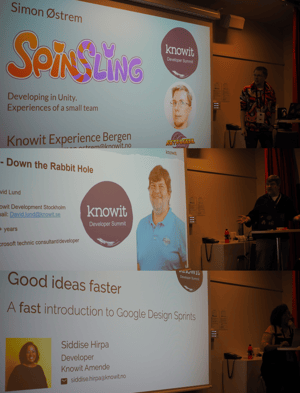 The officials started with lightning talks - 10 min presentations. The track I chose contained ”Developing SpinSling in Unity” by Simon Østrem, ”Q# - Down the rabbit hole” by David Lund and ”A fast introduction to Google Design Sprints” by Siddise Hirpa. Ok presentations all of them, but 10 minutes is awfully short time to present anything properly. But perhaps this is a good format for rehearsing talks - not saying these folks were first-timers, probably not. The Q# and the Microsoft Quantum Development Kit do seem interesting.
The officials started with lightning talks - 10 min presentations. The track I chose contained ”Developing SpinSling in Unity” by Simon Østrem, ”Q# - Down the rabbit hole” by David Lund and ”A fast introduction to Google Design Sprints” by Siddise Hirpa. Ok presentations all of them, but 10 minutes is awfully short time to present anything properly. But perhaps this is a good format for rehearsing talks - not saying these folks were first-timers, probably not. The Q# and the Microsoft Quantum Development Kit do seem interesting.
Before lunch, there was something else in the program - Open space. Chairs in a circle, discuss a topic for 30 mins, switch room, repeat for another topic, and so on. Perhaps not that fruitful, but a welcome change for mere lectures.
Saturday afternoon was again a set of 30 min talks. One of the dinner companions, Rickard Westberg of Knowit Defence Technology (new to Knowit but a veteran on the subject matter) talked about ”A paranoids guide to trusting open source”. Excellent presentation of an interesting topic. Can you trust closed source after hearing this?
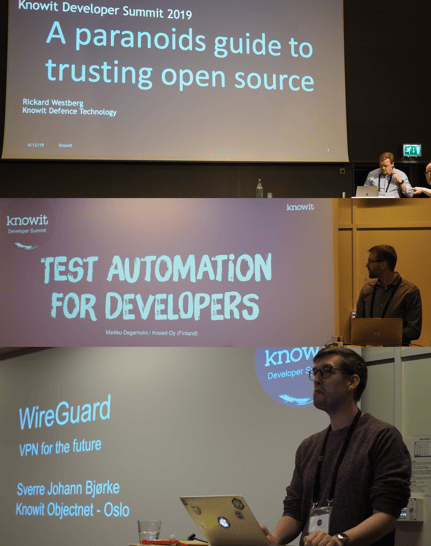
Our Markku Degerholm presented ”TraceRobot: A Pythonic Test Automation Solution”. Super interesting topic about basically how to get rid of the hideously ugly Robot Framework preprocessing code without losing any benefits of the framework itself. What was interesting as well was that the non-Finns in the audience were unfamiliar with our beloved (and behated) RF. I would say after TraceRobot gains some weight, there would be calling for some knowledge spreading across Scandinavia.
The last track would have contained our Sari Alander's ”Route 66 to DevOps”, but I wanted to learn of ”WireGuard, VPN for the future”, of which Objectnet's Sverre Johann Bjørke gave a nice presentation, configuring live a VPN connection between a server and his mobile.
And that was that. Except for killing time before our flight back to Helsinki.
